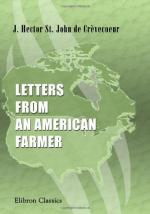confined to the narrow limits of your own country;
but, on the contrary, extends to the whole human race.
As an eloquent and powerful advocate you have pleaded
the cause of humanity in espousing that of the poor
Africans: you viewed these provinces of North
America in their true light, as the asylum of freedom;
as the cradle of future nations, and the refuge of
distressed Europeans. Why then should I refrain
from loving and respecting a man whose writings I
so much admire? These two sentiments are inseparable,
at least in my breast. I conceived your genius
to be present at the head of my study: under
its invisible but powerful guidance, I prosecuted
my small labours: and now, permit me to sanctify
them under the auspices of your name. Let the
sincerity of the motives which urge me, prevent you
from thinking that this well meant address contains
aught but the purest tribute of reverence and affection.
There is, no doubt, a secret communion among good men
throughout the world; a mental affinity connecting
them by a similitude of sentiments: then, why,
though an American, should not I be permitted to share
in that extensive intellectual consanguinity?
Yes, I do: and though the name of a man who possesses
neither titles nor places, who never rose above the
humble rank of a farmer, may appear insignificant;
yet, as the sentiments I have expressed are also the
echo of those of my countrymen; on their behalf, as
well as on my own, give me leave to subscribe myself,
Sir,
Your very sincere admirer,
J. Hector st. John. Carlisle
in Pennsylvania.
LETTERS FROM AN AMERICAN FARMER
LETTER I
INTRODUCTION
Who would have thought that because I received you
with hospitality and kindness, you should imagine
me capable of writing with propriety and perspicuity?
Your gratitude misleads your judgment. The knowledge
which I acquired from your conversation has amply
repaid me for your five weeks’ entertainment.
I gave you nothing more than what common hospitality
dictated; but could any other guest have instructed
me as you did? You conducted me, on the map,
from one European country to another; told me many
extraordinary things of our famed mother-country,
of which I knew very little; of its internal navigation,
agriculture, arts, manufactures, and trade: you
guided me through an extensive maze, and I abundantly
profited by the journey; the contrast therefore proves
the debt of gratitude to be on my side. The treatment
you received at my house proceeded from the warmth
of my heart, and from the corresponding sensibility
of my wife; what you now desire must flow from a very
limited power of mind: the task requires recollection,
and a variety of talents which I do not possess.
It is true I can describe our American modes of farming,




